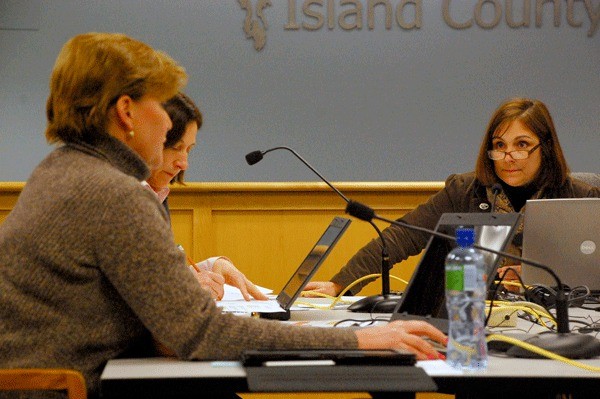The fate of lone Republican Island County Commissioner Kelly Emerson’s advisory ballot proposals was decided in a fiery debate with her Democratic colleagues in Coupeville Wednesday.
Over the course of a heated 40-minute brannigan, commissioners Angie Homola and Helen Price Johnson made it clear that they would not support either of Emerson’s proposals for reasons that ranged from ballot expense and labor demand concerns to accusations of “political grandstanding.”
Earlier this month, Emerson made a surprise proposal at the board’s formal Monday meeting to use advisory ballots as a means of gauging public support for property assessments or fees prior to their approval by the commissioners.
At the time of her original proposal, Homola and Price Johnson did not reject Emerson’s motions outright but asked for time to consider them and then have a discussion at the board’s informal work session.
As promised, the issue was brought up Wednesday but this time Emerson brought a second proposal to the table. She introduced a resolution to run the first advisory ballot this August by asking voters to weigh in on the Conservation Future’s Fund.
The pot of money is garnered from property taxes and is used to purchase or protect a variety of different types of land in Island County. It’s an optional tax authorized by the state.
Emerson began by saying that the Conservation Futures Fund was approved by the board in 1991 without going out to the public first by ballot measure. She said she believed it was time to fix that and, like she did when she made her original proposal, said she had met with the budget director and auditor and been assured there would be little to no financial impact if it was piggybacked onto an existing ballot, such as the August primary.
“Basically all we’re looking at it a little more ink,” Emerson said.
“I see absolutely no reason to not seek public input on this at this point in time,” she said.
But her fellow commissioners saw the matter differently. Price Johnson said she “begged to differ” about a lack of public input when it came to conservation futures, first implemented by three Republicans. The annual budget approval process is very open with multiple chances for the community to weigh in, she said.
Emerson argued that the advisory ballot would be more inclusive to those who can’t attend public meetings, but when Price Johnson responded by saying the proposal was a “fundamental change to county government,” Emerson went on the offensive.
Interrupting and then ignoring Price Johnson’s appeal for a chance to speak, Emerson claimed that advisory ballots are not uncommon and in no way represented a shift in government process.
“It may be a fundamental change to your county government,” Emerson said.
“Commissioner Emerson, you’ve made a proposal,” Price Johnson said. “Did you not want to have discussion about it?”
“I do but I want to have an apples to apples discussion,” Emerson responded. “You’re dreaming up scenarios where this has never happened.”
Much of the rest of the discussion was similarly heated but tensions reached a breaking point when Homola said she would like Island County Auditor Sheilah Crider to address Emerson’s claims that advisory ballots would come at little to no expense to county coffers.
Homola said she had reviewed the audio recording of the recent Monday meeting and had just finished reciting the exact time on the tape when Emerson interrupted again, saying she wanted to clarify her earlier comments.
Homola asked that she not be interrupted while speaking only to be interrupted again.
“Well, rule me out of order then,” Emerson said.
Crider did testify during the meeting and claimed she never said an advisory ballot would come at no cost to the county, though she did acknowledged that piggybacking issues onto existing ballots can be affordable.
Countywide elections, such as the August primary, are paid for by billing out municipalities or junior taxing districts with ballot measures for their particular share. Even if the ballot is packed with issues, the county would still have to pay for its part and the money would come from the general fund.
“There would be a cost,” Crider said.
“There are no free elections,” she said.
She could not say, however, exactly how much it would cost to put the conservation futures issue on the August primary ballot, nor could she say at the time how much it cost to put the highly controversial Proposition 1 measure on the ballot in 2010.
Emerson argued vociferously that Homola and Price Johnson had no trouble bearing the cost of that proposed tax increase, which was expected to generate over $2 million in 2011.
“What is wrong with us seeking public input?” Emerson said.
Price Johnson said she is “100 percent” about community input but doubted Emerson’s true motives.
“If this were truly about citizen engagement and informing voters, you have my support,” she said. “This is not. No, this is political grandstanding.”
She went on to say there were other vehicles to get public opinion, such as public surveys, and that she is open to those kinds of ideas. However, she would not the use of advisory ballots, which she said would cost money and overburden the auditor’s office.
“This may be really good for Tim Eyman or maybe even the Tea Party but I think Island County wants us to do our job,” Price Johnson said.
Homola made it equally clear that she would not support either of Emerson’s proposals, saying she believed she was elected to make tough choices and that it was pointless to pay for public input when the current public hearing process accomplishes the same thing for free.
“At the end of the day, it comes right back to us to make a decision,” Homola said.



